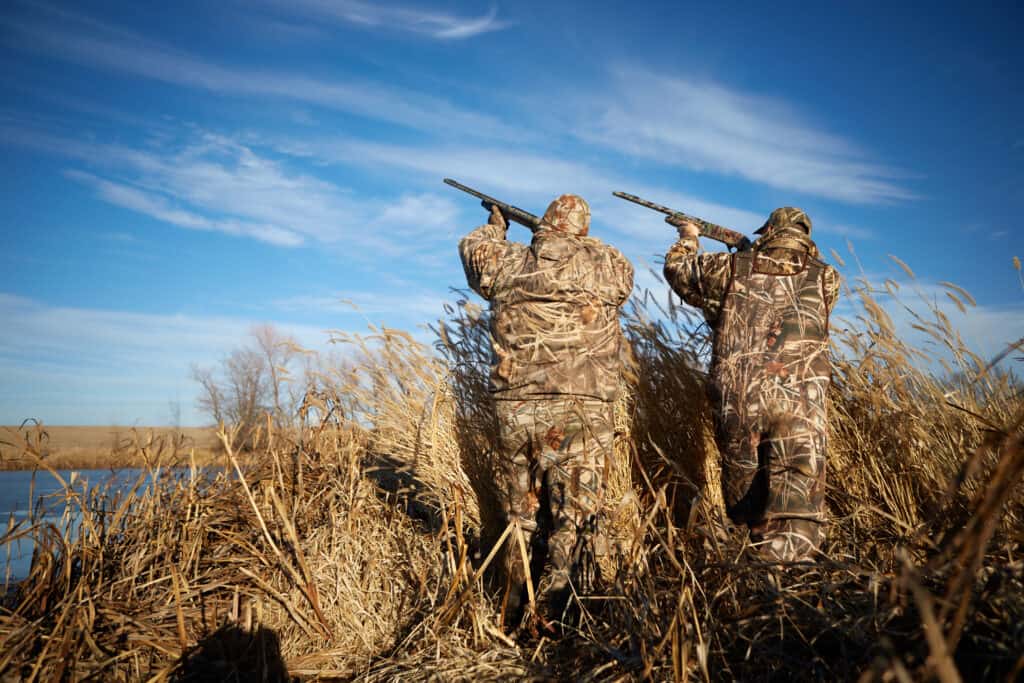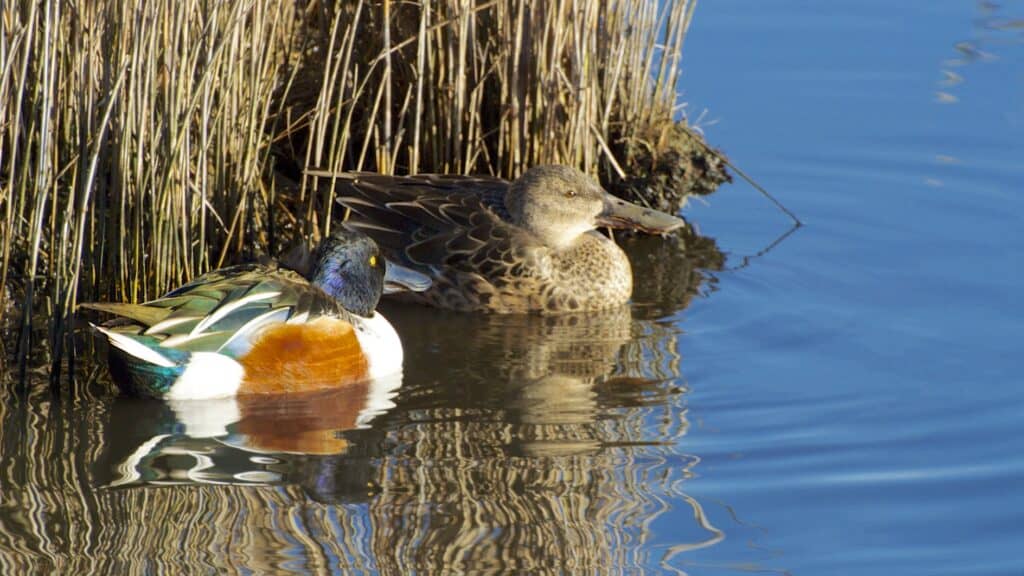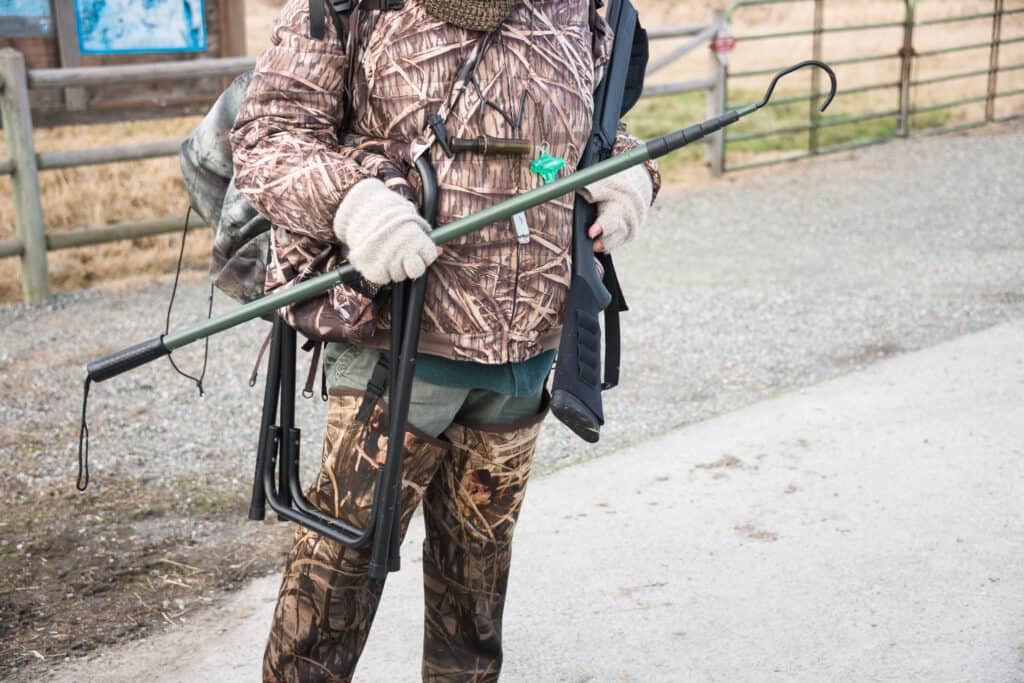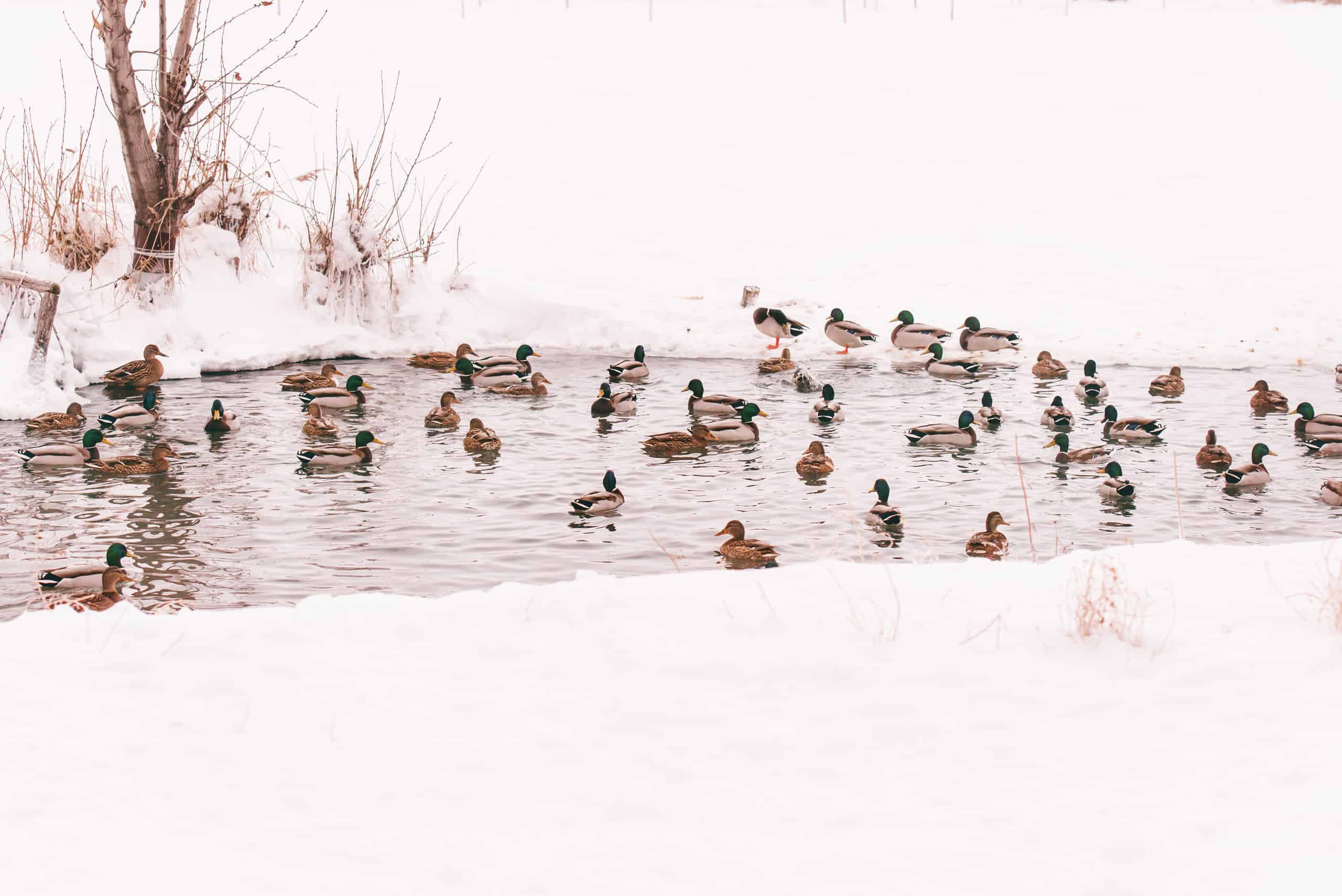Hunting is a popular pastime for many people, especially those who enjoy nature and the thrill of the hunt. Pennsylvania offers plenty of opportunities to hunt various game animals, including ducks.
To ensure you enjoy the next Pennsylvania hunting season, we’ve compiled a guide about duck hunting. This article covers hunting places and requirements, such as legal hunting age, permits, and hunting gear. You will also find information on the daily bag limit and possession limit.
Duck Hunting Dates in Pennsylvania

Take the time to scout the area you want to hunt and monitor the movement and rhythms of the ducks prior to setting up your blind.
©CLP Media/Shutterstock.com
Pennsylvania has an extensive list of dates for duck hunting seasons. If you are looking forward to hunting duck, coots, mergansers, or sea duck, you should know the season begins October 8 and ends November 30 each year, with a few exceptions. In some places, hunting ends in December or January.
- If you are based in the North Zone of Pennsylvania, the hunting season lasts from October 8-22 and later resumes from November 15 to January 7.
- For those based in the South Zone, the hunting season runs from October 8 to 15, and later resumes on November 22 and ends on January 21.
- For hunters based in the Northwest Zone, the hunting season starts on October 8 and ends on December 3. They can resume hunting on December 27 to January 7.
- And for those based in Lake Erie Zone, the duck hunting season starts on October 31 and ends on January 7.
It’s important to note that the regulations differ depending on what body of water you plan to hunt in, so make sure to check with the local fish and game commission before heading out.
Do You Need a Permit to Hunt Ducks in Pennsylvania?
All hunters aged 16 or older must have a valid hunting license to duck hunt in Pennsylvania. The hunting licenses in Pennsylvania are issued from July 1 through June 30.
All first timers must complete the Hunter and Trapping Safety Course before they can begin hunting. The hunting classes are free and available at various locations in Pennsylvania.
The cost of a hunting license in Pennsylvania is as follows:
- Adult (17-64): $20.97
- Junior (12-16): $6.97
- Senior citizens (65+): $9.97. And lifetime licenses go for $51.97, but holders are required to apply for renewal each year. They are given a valid harvest tag for the current hunting year.
- Military: $2.97
- Disabled Veteran: free
Out-of-state visitors will pay the following:
- Adult (17 and over): $101.97
- Junior (12-16): $41.97
- Temporary permit (7-day): $31.97
Additionally, those who wish to hunt migratory birds, including ducks, must also purchase a federal stamp known as a Migratory Game Bird Stamp, available at any licensed vendor throughout the state and online via the U.S. Fish & Wildlife Service website.
Hunters are encouraged to give an online report about the banded ducks, geese, woodcock, and doves they harvest. This information assists the Game Commission and the U.S Fish and Wildlife Service in learning where, when, and what species of migratory birds were hunted.
It also informs them on bird movement, survival, and harvest rate, which is crucial in successfully managing migration birds and setting hunting regulations.
Note that Sunday hunting is illegal for all game except foxes, crows, and coyotes.
What’s the Age Limit for Hunting Ducks?
The legal minimum age for duck hunting in Pennsylvania is 12 years old; however, minors under 16 are not allowed to possess firearms unless accompanied by an adult of 18 years or over. Responsible gun safety practices must be taught so kids can enjoy these activities safely and responsibly. Eleven-year-olds can also apply for the permit provided they reach 12 years by June 30.
Persons over 16 must have a federal duck stamp or an electronic duck stamp with their Pennsylvania hunting license. And those aged 12 must have a Pennsylvania migratory game bird license.
What’s the Daily Bag Limit?
The daily 2022-2023 bag limit for ducks in Pennsylvania is 6. You can have up to 18 in possession of any species at a time.

Beware of the daily bag limit to avoid breaking the law.
©Ian Kirk from Broadstone, Dorset, UK / CC BY 2.0, via Wikimedia Commons – Original / License
However, there are exceptions. For instance, if you are hunting the following species, then your daily limit should not exceed the following:
- One hen mallard
- Two black ducks
- Two redheads
- One pintail
- Three wood ducks
- Two canvasbacks
- One fulvous whistling duck
- Three eiders (one female and two male)
- Three long tailed ducks
- Three scoters
Additional restrictions may apply seasonally, so you must stay current on the regulations.
Possession Limit
The possession limit is three times the daily bag limit.
Places to Go Duck Hunting in Pennsylvania
Pennsylvania offers plenty of opportunities to duck hunt throughout the state, thanks to its many wetlands, rivers, lakes, and other bodies of water, home to various ducks.
Some popular places for duck hunting include Pymatuning State Park near Meadville, Lackawanna State Park near Scranton, Prompton Lake near Honesdale, and French Creek State Park in Berks County.
Another jewel for hunting ducks in Penn State is the Susquehanna River Basin, which is the main waterway in the basin and flows from the north of the state to the south. The river is accessible to the public and has plenty of ducks, making it the best place to kick off your hunting season.
The Harrisburg area and other stretches of the Susquehanna River Basin offer a wide range of migratory birds, such as scaup, canvasbacks, mergansers, mallards, and black ducks. However, the number dwindles as you move away from the main river.
Type of Gear You Need for Duck Hunting
If you want to hunt ducks successfully, you must have the right gear, including a gun, bow & arrow, decoys, and camouflage clothing. The type of gun or bow you should use depends mainly on personal preference. It’s important to note that lead shot has been banned within certain zones, so you should use a steel shot instead.
One also needs proper camo clothing and a variety of decoys depending on the species you’re hunting.

Get the right duck hunting gear to ensure you don’t go home empty handed.
©Denise Lett/Shutterstock.com
You must also have a reliable duck call. Most ducks will respond to the call, making hunting easy. So make sure that the device is easy to use.
Shotguns are restricted to three shells and only use non-toxic shots when shooting (no lead shotgun shells). You can also use electronic hunting decoys. Avoid wearing fluorescent orange vests as they alert the ducks. Remember to wear lifejackets when using boats, canoes, or kayaks.
And since most duck hunting happens in water, ensure you have proper clothing to keep you warm and dry, including waterproof gloves and a gear bag to carry your accessories.
How to Find Duck Hunting Spots
Apart from Susquehanna River Basin, other duck hunting spots in Pennsylvania exist, including lakes and state parks. You may wonder how to find duck hunting spots in Pennsylvania. The best method is to tail them, and eventually, you’ll find a bunch of them.
You can also ask hunting experts about hotspots, though you may have to pay entrance fees to private properties. You can also use digital maps, as most hunting apps provide hunters with areas where you can find ducks, thus helping you eliminate certain regions. Lastly, consider forming a group with other duck hunters. This will help you gain access to information on where the ducks are during that season.
Thank you for reading! Have some feedback for us? Contact the AZ Animals editorial team.








